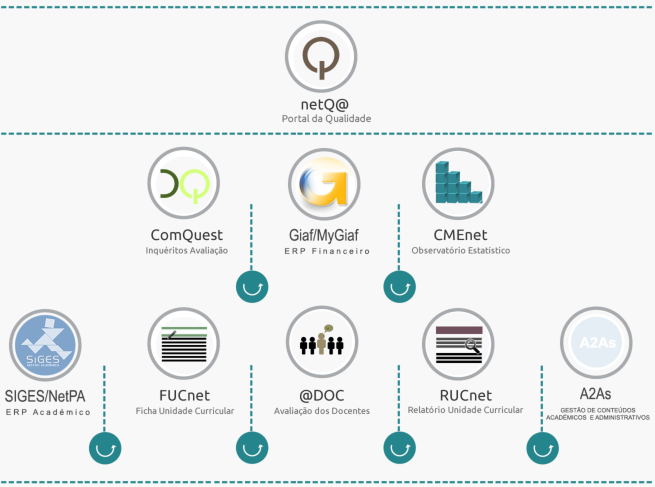SIGQ - Internal Quality Management System
Scope
The European standards for quality in higher education state that institutions should have a policy and procedures for quality assurance, particularly of their programmes and degrees, and that to this end they should develop and implement a strategy for continuous quality improvement. They also state that the strategy, policy and procedures should have a formal status, be publicly available and include a relevant role for students and other partners.
In the guidelines associated with the European standards, it is recommended that the institutional policy statement for quality should include, in particular, the institutional strategy for quality and the quality standards, the organisation of the quality assurance system, the responsibilities of organisational units and individuals in quality assurance, including students, and the forms of implementation, monitoring and review of the quality policy.
The internal quality management system at ISLA - Polytechnic Institute of Management and Technology (SIGQ-ISLA) is guided by the indications provided by European standards and other determinations contained in the national legal system.
Matrix between A3ES and ISO 9001 references
Scientific, Cultural and Pedagogical
Project ISLA Gaia's scientific, cultural and pedagogical project is based on the promotion of scientific and technological knowledge in the different areas of knowledge, namely: Education; Arts and humanities; Social sciences, commerce and law; Science, maths and IT; Engineering, manufacturing and construction; and Services.
ISLA Gaia's mission is to develop teaching based on the acquisition of skills, scientific and technological research and the provision of services to the community, contributing to the professional, social and cultural development of its human resources.
ISLA Gaia's main objectives are:
- Promote polytechnic higher education in the scientific areas it teaches;
- Promote cultural diffusion in the community in which it operates;
- To prioritise scientific and technological research;
- Develop community support services; Participate in international higher education training and research networks;
- Promote the international mobility of the academic community.
Information Systems
The Institution's Quality Portal is now an integrated system, supported by an Oracle database, the result of efforts and co-operation between the Institution and its two ERP suppliers - Digitalis and Indra Company. In this project to integrate solutions, it was possible to aggregate the specific data from each source of information into measurable indicators that are managed on a Business Intelligence platform, guaranteeing, on the one hand, the monitoring of these indicators and the respective corrective actions and, on the other, the realisation of the Institution's Quality Portal (NetQ@).

SI Quality diagram
Teaching
The Curricular Unit Card (FUC) is to be filled in by the respective teacher and, in case the curricular unit is taught by more than one teacher, by the respective responsible teacher.
The FUC includes the following information:
- The name and code of the CU;
- The name and code of the courses in which the UC is inserted;
- The learning objectives (skills to be developed in UC);
- The programmatic content;
- The teaching load, expressed in terms of contact hours, individual work and number of credits;
- The teaching/learning methodologies used;
- The detailed method and criteria for assessment;
- The bibliography (basic and additional recommended bibliography);
- The teachers of the UC;
- The timetables of the classes and the opening hours of each teacher.
The reports aim at characterising, in a summarised and systematic way, the organisation and functioning of teaching, through automatically obtained data and additional information resulting from reflection elaborated by the teaching teams and the course committees.
The Curricular Unit Report (RUC) aims at briefly presenting an overall assessment of the functioning of the CU, in which relevant pedagogical practices and the acquisition of competences by the students are identified, and improvement plans are defined whenever the results are considered unsatisfactory.
The main objective of the Annual Report of the Study Cycle (RAC) is to characterize, in a summarized and systematic way, the organization and the functioning of the course, through data obtained automatically and through additional information resulting from reflection elaborated by the course management.
Human Resources
In the polytechnic field, the Performance Evaluation of Teachers is part of the framework that organises the scientific and pedagogical matters of each educational establishment.
At ISLA Gaia, this process is based on the strategic plan for scientific, pedagogical and cultural performance, guaranteeing a rigorous assessment of the quality of teaching, naturally based on a methodological guideline of scrupulous personal and institutional accountability.
The main aim of the appraisal process is to enhance the performance of employees and continuously improve their work, in fulfilment of ISLA Gaia's mission and objectives.



